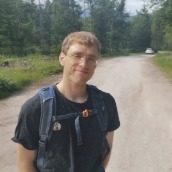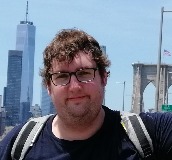YAG PhD-projects 2022

Federico Petris
Supervisors: Bettina Reitz-Jossee (Arts- Classics) and Julia Costa Lopez (Arts - International Relations)
In the project, I research uses of Latin and re-adaptation of original Latin phrases as these are currently used in political discourses on social media. More specifically, I will analyse uses of Latin in online political discourse as a case of how individuals might embody norms of power and subjectivities that are developed in an ‘elsewhere’ without quite becoming themselves. I will focus on both on the symbolism of the Latin language and on the grammar of the phrases encountered, and ask why Latin is the chosen medium in online political discourses, and what it means to engage in (online) political discourses through Latin.
On these terms, the project engages with several debates that have been developed within the disciplines of International Relations and Classics, but it will also borrow from communication and media studies. Indeed, the novelty introduced by the project is that the dynamics of interest take place through a medium – Latin – that is used in online fora. For this reason, I will resort to a number of computational means and digital techniques that have been developed for the systematic collection of online data and for the subsequent display of large quantities of gathered material in an aggregated form. The resulting visual elements will allow me to abductively gather subjective positions in a systematic and longitudinal way, hence to address the questions guiding the project.

Robbert Scholtens
Can you hear the shape of the universe?
Supervisors: Marcello Seri (FSE), Rien v/d Weygaert (FSE), & Holger Waalkens (FSE)
The aim of this project---started last September---is to determine the "shape" of the universe by means of interpreting Cosmic Microwave Background (CMB) data. Here by shape we mean the structure of the universe at the very largest scales, i.e. its topology. One idea in particular is that our universe could be multiply-connected. That is to say, if you travel far enough into any/some direction, you will eventually come back to where you started---much like walking around on a sphere or along a donut. This connectedness allows for only a very particular set of vibrations to take place, much like the particular harmony of notes produced by a musical instrument.
This knowledge of the vibrations should then inform certain (statistical) properties of the CMB, from which we can test the accuracy of the proposed model to our own universe. The CMB is the farthest back in time we can see using observations, and as such is also the largest "structure" that we can observe. As such, it is the ideal/only structure against which we can test our hypotheses for the universe.
In addition, the CMB may provide us other clues about the large scale structure. It is claimed there are particular directions which are "lined up" in the CMB, which may also be explained if certain features of distance in the universe are assumed. For instance, if not all 3 spatial directions are fundamentally the same!
My research is precisely to investigate the relation between the theory of vibrations (spectral theory, as it is known in the business), and its application to cosmology. In the ideal case, we are able to find a model that reproduced the data that we have harvested from the CMB exactly, confirming that that model is what the universe looks like on the largest of scales!
Konrad Turnbull
Supervisors: Panos Merkouris (Law) and Marijke Lelieveld (FEB)
Perhaps I may look back at this comment towards the end of the PhD and think I was a fool, but in all honestly the start to my PhD with YAG has been a dream scenario. My PhD is supervised by Dr. Marijke Leliveld, in the faculty of economics & business, and Prof. Panos Merkouris, from the faculty of law. My research relates to how international human rights courts address cases involving structural discrimination and the public’s perceptions of structural discrimination & these institutions.
If I have to point out any difficulties that I have faced, it could perhaps be that I am currently taking a course in Experimental Research Design, as it has been quite a few years since I last took such a course. So, very much a first world problem as, in this case, it merely means knocking the rust off of the experimental sections of my brain. In the end, the pros of learning new things far, far, far outweighs the cons faced in this slightly steeper learning curve.
I cannot reiterate enough how lucky I feel to both have this opportunity and to have such supportive supervisors. Whether it be an email with a conference recommendation or simply asking how my partner is doing, it is refreshing to work in an environment which truly cares for my personal and professional wellbeing. Our discussions are productive and, perhaps (partially serious) most importantly, we all seem to share similar senses of humour, which definitely serves as the proverbial cherry on top for our working relationship.
| Last modified: | 09 July 2024 4.32 p.m. |
